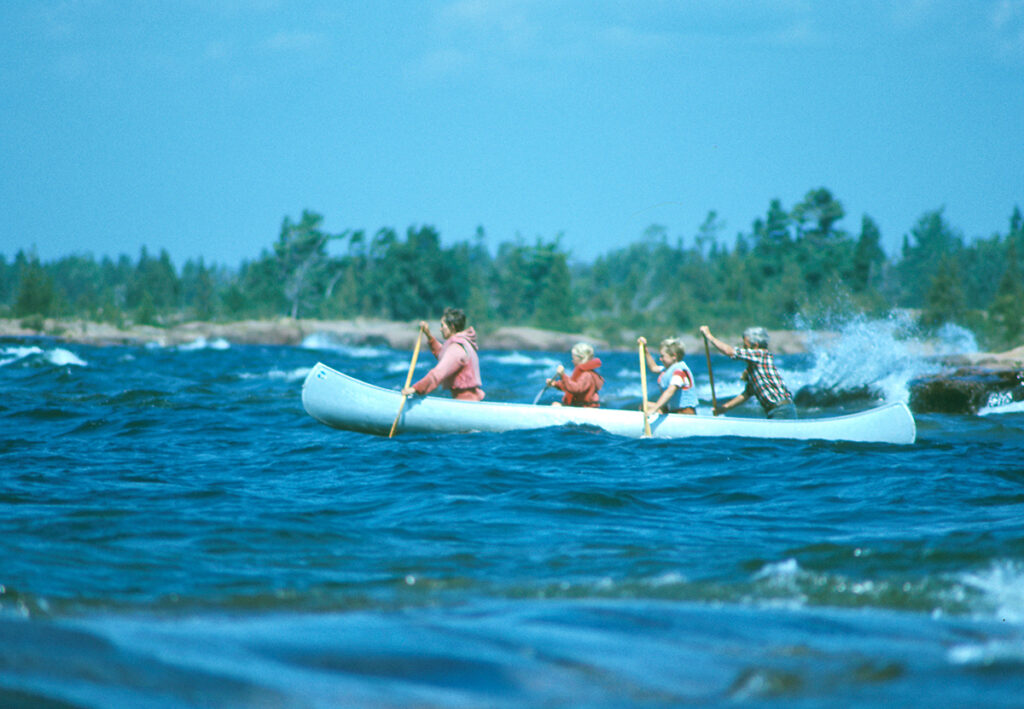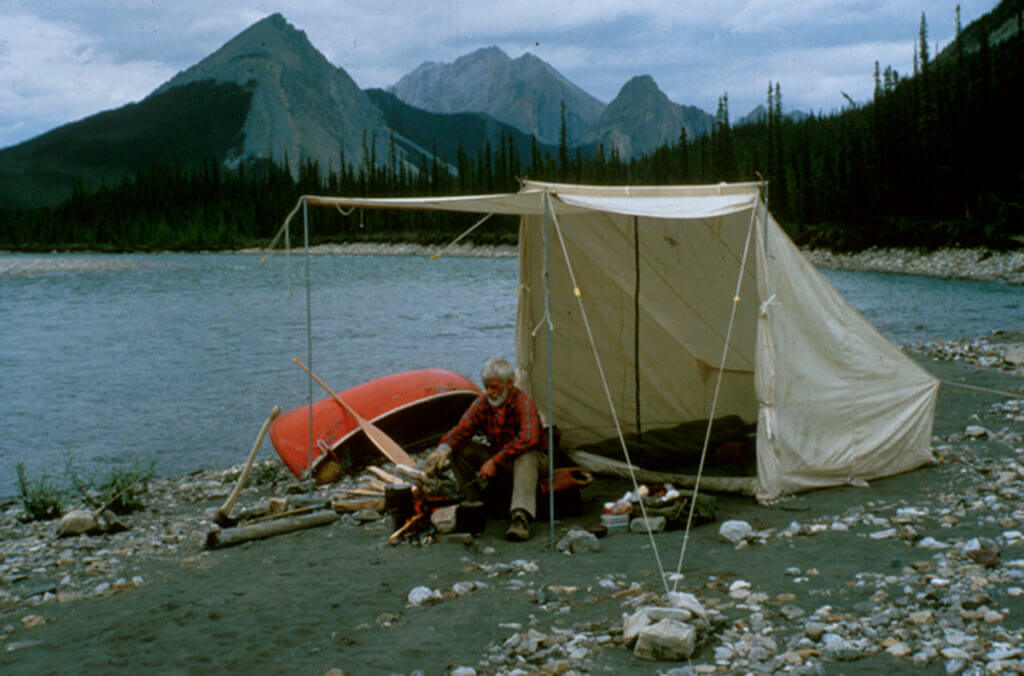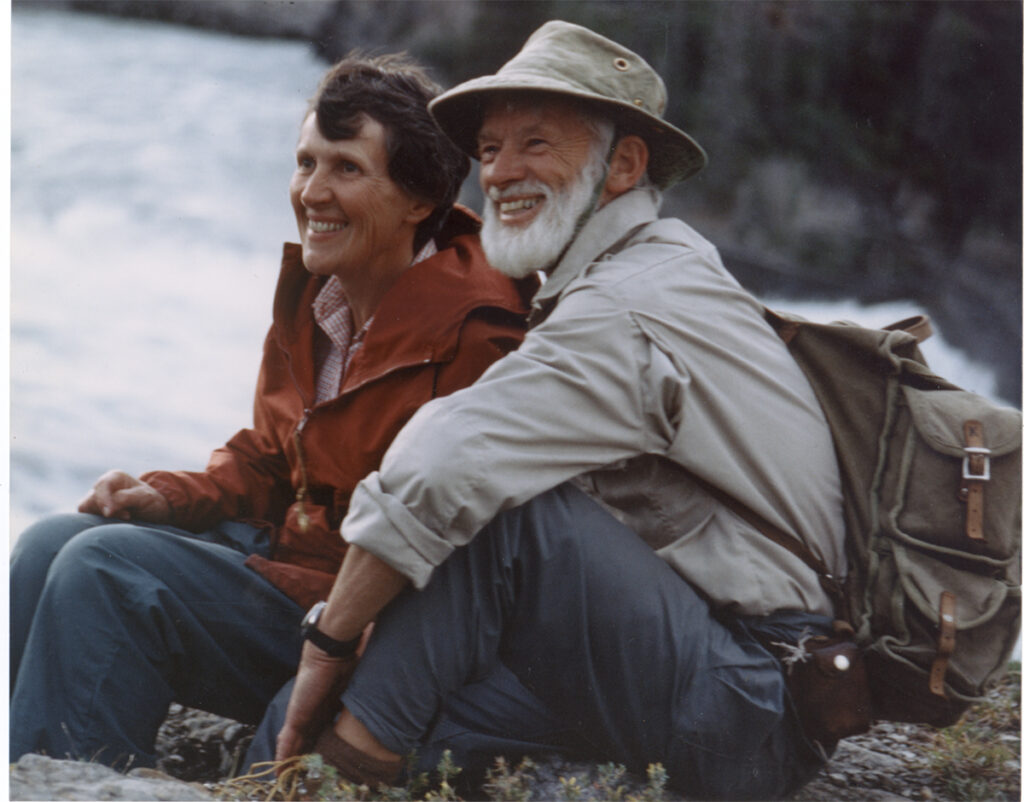The Story of my Grandparents’ Last Trip on the Nah?ą Dehé (Nahanni River)
Joyce Joins the Bill Mason Swim Club
Author: Willa Mason, Guide and Instructor
I’ve never met my grandfather. He passed away nine years before I was born, so it’s through the stories around me that I understand the impact he had on so many people’s lives. You may recognize his name as the author of Path of the Paddle, Song of the Paddle, and Canoescapes, or as the filmmaker behind Paddle to the Sea and many other National Film Board films. A playful and adventurous dad and friend, Bill Mason was also known for pulling his family headfirst into adventure and his paddling partners headfirst into the river. Though his work has immortalized his passion and perspectives, I wanted to learn more about Grandpa Bill’s accomplishments within the context of my family. An essential character in those stories is my Grandma Joyce.
Grandma Joyce was Bill’s wife and partner in adventure. She is soft spoken and one of the kindest people I know; she’s pragmatic, humble, and always willing to give her time to those in need. Because she never casts herself as the main character, it has taken me many afternoons curled up on her couch to begin understanding her role in the family adventures.

Five years ago, Joyce moved from the family home on Meech Lake to an apartment in Ottawa. There she runs the resident library and is spearheading a project to bring all of the residents’ life stories together into one shared album. Due to COVID-19 pandemic restrictions, I haven’t been able to sit on her couch since December 2019, but when I chatted with her over the phone, I could hear her become more animated as we delved down memory lane and into her 1988 Nah?ą Dehé (Nahanni River) trip. It was my grandfather’s last canoe trip, and an experience I’ve always understood to be special for our family, but I had never heard Grandma’s side of the story. She mentioned two things in particular: the feeling of smallness, and the day she joined the “Bill Mason Swim Club” – a capsize that illustrates the dynamic of the trip.
A nurse by trade, Joyce married Bill in their shared hometown of Winnipeg. Together, they moved to Chelsea, Quebec, a place where Bill could better pursue film work. After choosing to share life with a canoeist, she quickly learned the ropes near their home on Meech Lake. There, she raised their two children Paul and Becky in a house full of laughter and friends. You can catch her in some of Bill’s films, but her role was much more instrumental than some might think. From editing books and sorting camping equipment to mending plaid shirts for the films, Joyce was always involved in the projects. She quickly accumulated extensive canoe tripping experience on Lake Superior, Georgian Bay, and local rivers, but it wasn’t until 1988 that she took her first trip to Canada’s Northwest Territories.
Fascinated by the geography of Nah?ą Dehé (Nahanni River) and its UNESCO World Heritage site designation, Bill had already travelled down the river with both of his kids. He had planned to share the river with Joyce in 1989. In June of 1988, Bill was diagnosed with cancer of the small intestine, and he didn’t pursue treatment. After years of being scattered between film shoots, art schools, and whitewater guiding work, it was time for the Mason family to be in the same place at the same time for Bill’s final river trip.
Leading up to the departure date, the whole family was fully immersed in editing Canoescapes and Song of the Paddle. While they were busy with the books, family friend and then-owner of Blackfeather, Wally Schaber, packed food, secured equipment, and gathered a team to paddle the Nah?ą Dehé (Nahanni River) River. Bill and five others started at the Mooseponds section on July 19th, while Joyce and the rest of the crew joined at Island Lakes on July 26th.
With excitement and trepidation, she boarded the small plane from Łı́ıd́ lı̨́ı̨́Kų́ę́ (Fort Simpson) headed towards Island Lakes. Joyce felt excitement to paddle the river she had heard so much about and excitement to see the sky-scraping cliffs and turbulent waters that filled her imagination. She had trepidation about paddling through the famous whitewater, and she worried that Bill might not be well enough to enjoy his last trip down this special river.
Joyce had been looking forward to hugging her husband, but after landing at Island Lakes and making the small trek to the group’s meeting point of Moore’s cabin, he was nowhere to be seen. He was up climbing a mountain, and she wouldn’t see him until nearly sunset. She was inwardly relieved to see that he still had enough energy for his usual adventurous explorations. When faced with soaring peaks promising a new perspective and streams flowing from a valley waiting to be explored, it’s hard to sit still.

Years later, Joyce still remembers feeling very small when she heard the roar of Náįlįcho (Virginia Falls) a few days into the trip, long before the waterfall was even in sight. Thirty-three years later, I could hear the awe in her voice as she described the faint rumble, growing louder until it was impossible to ignore: “You don’t forget that. The loud noise. Being so far away from the waterfall…” Hearing the sound of far-away thundering water was her first taste of Náįlįcho’s impactful presence. The history and grandeur of spaces like Nah?ą Dehé (Nahanni River) made her feel small and humbled.
After a few more days of portaging and paddling, the group approached the horizon of Figure 8 Rapid. Joyce could feel the apprehension building. After scouting the rapid, she was nervous about the strong currents that threatened to push their canoe towards a looming cliff. Joyce said she wanted to portage, her son Paul said, “Stern paddlers always do this one paddling on the right,” and Bill said “Follow my lead…”
The roar of the turbulent water bouncing off the rock face was all she could focus on. The rebounding wave hit the canoe broadside, pushing the right edge upwards. As Bill was paddling on the left, he had no anchor on that side to help flatten the canoe. Joyce felt the water reach her neck as she tumbled into the turbulence, and it was impossible to tell which way was up and which was down. Before too long, she popped up and her hands clung to the first thing her fingers found: solid rock. With her yellow dish gloves carefully selected for their windbreaking properties, she hung to the cliff just above the waterline with all her might. Quickly, Bill’s head came up: “Follow me!” “Not a chance, never again!” she thought to herself. She knew that Bill was skilled at understanding currents and orienting himself underwater, but Joyce couldn’t say the same about herself. Certain she would die if she let go, she hung on tight. From across the river, Judy, Paul’s wife, saw her mother-in-law clinging on for dear life and thought, “I guess we’d better go get her.” Downstream, Becky and Reid fished Bill out of the river. In his hypothermic state, he couldn’t spot Joyce and would not calm down until the group was fully reunited.
They regrouped downstream, slightly shaken and very cold. They double checked their gear and mentally prepared themselves to get back in the canoe. Doing jumping jacks to warm up, Joyce had an overwhelming sense of apprehension, but she knew the only practical option was to push aside the fear and continue downstream. Later, at their campsite, they warmed up with a little drink, “And it wasn’t tea or coffee!” Joyce told me with a mischievous grin. My dad Paul added, “I’ve paddled this river 18 times, and the only canoe I’ve ever had flip in Figure 8 rapid…was my parents’. Welcome to the Bill Mason Swim Club, Mum!”.

Over the next few days, Joyce’s confidence slowly grew back. As the group cheered, laughed, and helped each other pick their lines down the rapids, Joyce’s trepidation about the trip began to fade. She was feeling more comfortable, and she was relieved to see that the cancer wasn’t impeding Bill’s usual joy of whitewater. She felt fortunate to share this place with him, and he never once complained about his health. Sometimes though, she noticed that he would quiet down or retreat to his tent for alone time, a reminder of the weight of his diagnosis.
In a riverside hot spring, someone unearthed an inflatable crocodile pool toy from their pack. With lighthearted laughter and joyous innocence, the paddlers let the sulfur stench strip away the river trip dirt and the luxurious natural warm water thaw out creaky muscles. It’s easy to laugh when the sun is shining and the water is warm, but I get the impression this group of friends kept spirits high for most of the trip. Laughter is truly the only productive way to respond to a humbling faceful of water.
When the weight on her shoulders required serious thinking and decision-making, the river gave my grandmother the permission to play and something to laugh at. When it comes to picking campsites, Grandma Joyce likes spots with wind to blow away the bugs, medium sized rocks to hold down the tents, a few trees for shade, and a nice view for her bathroom breaks. For the first two weeks on Nah?ą Dehé, sites like these are easy to find, but downstream of the hot springs, they are hard to come by. Even now, the mosquitoes dominate her memory of the last days on the river. She remembers them being so bad that she wouldn’t get out of the tent for dinner. Always one to look on the bright side, she enjoyed working together to break camp as quickly as possible, racing the mosquitoes to the canoes. Where the current is quick but not turbulent, the river provides a rare opportunity: floating breakfasts. Drifting gently on a magic carpet moving downstream, the canoes were a harder target for the insects to find.
Towards the end of the trip, the river began to widen, and the current slowed. The quiet waters provide infinite time for the mind to wander, and a sense of finality overcame Joyce. As Nah?ą Dehé shrank into the background, thoughts of Bill’s cancer moved back towards the foreground. To the river, a hospital bracelet means nothing. The river doesn’t care if you are grieving, celebrating, full of ego, or lacking confidence. The river pushes and pulls, challenges overconfidence, reveals one’s true grit, shifts the focus away from our problems, and builds camaraderie. The river unearths a playful spirit within the ever-serious, forces new perspectives, and gives us solitude.
Now a canoe instructor and river guide myself, it is my greatest joy to help others fall in love with the river experience. For me that has been an experience of community, challenge, humility, and empowerment. Through Joyce’s stories, I understand the common thread between her Nah?ą Dehé trip in 1988 and my own in recent years. When I visit that river in particular, I often pause at the top of a hike or near a swimming hole, and I feel connected to my family who have stood in that same place before me.
Though we are striving to be as accurate and respectful as possible in our use of Traditional names of places and Peoples, we recognize that we are bound to make mistakes. Please reach out to us anytime – we welcome the opportunity to listen, to learn, and to connect with you. info@borealriver.com
Links:
Read: Imagine the Nah?ą Dehé (Nahanni River)
Read: River trips of the Nah?ą Dehé (Nahanni River)

